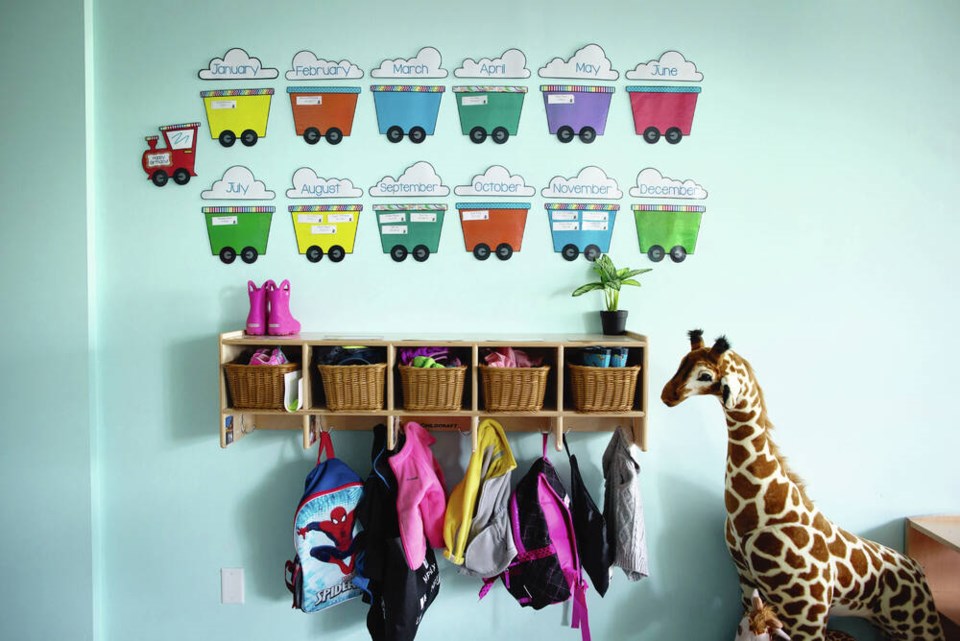Cabinet documents are sometimes hard to decipher because they come with a lot of jargon and complicated options. So the Ministry of Children and Families deserves full credit for breaking out of that mode and writing one that is forthright and unambiguous.
It’s an outline of a long-range plan to sharply curb private child care providers in B.C. by cutting them off from any funding related to increasing spaces. That plan was accelerated last summer by Minister of State for Child Care Katrina Chen.
Opposition B.C. Liberals made the documentation on that decision public Tuesday. So a lot more cards are now on the table than have been over the years the NDP has been promising $10-a-day child care.
It’s long been suspected that the NDP government didn’t have a lot of room in its child care expansion plans for private providers, who often charge more and pay staff less. The cabinet decision paper confirms it. It was brought to light via a freedom of information request.
The paper refers to a quiet cabinet committee decision a year ago to stop funding the creation of new spaces at private facilities gradually. It states the government is moving away from “market-based child care” to a “universal coordinated system.” It “recognizes it may be cost prohibitive for for-profit providers to remain in the sector, making the creation of these new spaces non-viable in the medium-term.”
And finally, it recommends that cabinet “discontinue for-profit eligibility for the New Spaces Fund” and “do not create any additional incentive programs.”
To be clear, it recommended barring private daycares from applying for expansion funding and not making any more incentives available to them. So the long-term plan was accelerated and the funding cut-off was imposed last summer.
Minister of State for Child Care Katrina Chen signed off on that option on June 17, a few weeks before B.C. and Ottawa signed a multi-billion-dollar child care program.
So it’s clear now that big expansion of cheaper daycare is going to be oriented toward public and non-profit providers.
The document says curbing the private ones doesn’t impact their eligibility for continued operating funding. But cutting them off from funding to expand spaces would slow the “disproportionate growth” of that sector.
The decision surrenders the main advantage of private providers – they are meeting the huge demand a lot more efficiently than the public and non-profit ones. Private ones have grown steadily over 15 years while growth in the public ones slowed starting in 2017 (the year the NDP took power).
Over the last three years, the document says 84 per cent of private daycares that secured funding to open new spaces got them operational. Public ones managed just 10 per cent and non-profit ones 6 per cent. That represents much of the gap between the NDP’s continual claims to have funded 26,000 new spaces, versus the far smaller number that are actually occupied by children.
Even Chen acknowledged in the legislature last summer – just before signing the decision paper – that 90 per cent of the new spaces opening up are for-profit, because they build and open them faster.
The non-profit and public ones take longer, she said. “A lot of them, because of the partnerships with local governments, school districts and non-profit providers could take a bit longer than the for-profit spaces.”
Chen said the downside to growth of the private facilities is that they don’t tend to last as long and aren’t as stable as having community assets on public properties.
She told a legislature committee then: “We definitely want to work with the diverse providers across the province.” But she qualified that with: “At the same time looking at how we better create long-term community assets that support families for generations to come.”
On Tuesday she told the legislature that funding has been increased to all providers, including for-profit ones. The funding maintains spaces through operating grants, wage enhancements and “start up funding to create many, many more spaces.”
B.C. Liberal critic Karin Kirkpatrick said the decision paper reveals the opposite. The NDP is making an ideological decision to drive private child care providers out of business, she said.
The main implication looks to be continued delays. While the private ones opened spaces quickly, the decision paper said the majority of the not-for-profit and public projects funded in the last few years “are not yet operational.”



